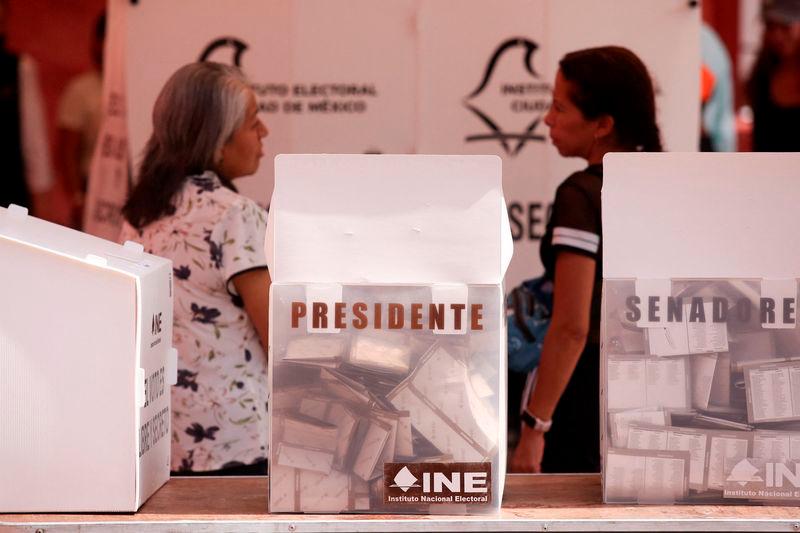MEXICO CITY: Most polls closed in Mexico’s election on Sunday with the country expected to make leftist Claudia Sheinbaum, the ruling party candidate, their first woman president. After a day of voting, marred by violence and the killing of two people at polling stations in Puebla state, polls closed across much of Mexico at 6 p.m. local time with the exception of the country’s westernmost time zone which includes the northern Baja California peninsula.
In Mexico City, where a tight contest is expected for mayor of the capital, both main candidates said they had internal polls saying they had won. Ruling party MORENA said its polls showed their candidate Clara Brugada had won the contest, while Santiago Taboada - representing a coalition of opposition parties - said his team had surveys showing he was victorious. An exit poll by the El Financiero newspaper said Brugada had a “slight advantage” without giving exact figures.
Mexico’s largest-ever elections have also been the most violent in modern history, with the killing of 38 candidates. The deadly violence has stoked concerns about the threat of warring drug cartels to democracy.
Sheinbaum, who has led in opinion polls over her main competitor Xochitl Galvez, will be tasked with confronting organized crime violence, if elected. More people have been killed during the mandate of outgoing President Andres Manuel Lopez Obrador than during any other administration in Mexico’s modern history, although the homicide rate has come down over his term.
A victory by either woman would represent a major step for Mexico, a country known for its macho culture. The winner is set to begin a six-year term on Oct. 1.
On her way to vote on Sunday morning, Sheinbaum told journalists it was a “historic day” and that she felt at ease and content.
“Everyone must get out to vote,“ Sheinbaum, a physicist and former Mexico City mayor, said on local TV.
Galvez, a businesswoman and former senator who represents an opposition coalition comprised of the Institutional Revolutionary Party (PRI), the right-wing PAN and the leftist PRD party, chatted with supporters before casting her ballot early on Sunday.
“I am very very optimistic,“ Galvez said, adding that she was expecting a busy day.
Lopez Obrador, Sheinbaum’s mentor, greeted supporters and posed for photos as he walked from the presidential palace to vote with his wife.
“I never imagined that one day I would vote for a woman,“ said 87-year-old Edelmira Montiel, a Sheinbaum supporter in Tlaxcala, Mexico’s smallest state.
“Before we couldn’t even vote, and when you could, it was to vote for the person your husband told you to vote for. Thank God that has changed and I get to live it,“ Montiel added.
Almost 100 million Mexicans were eligible to vote in Sunday’s election. Other positions up for grabs include Mexico City’s mayor, eight governorships and both chambers of Congress. About 20,000 elected positions are on ballots, the most in Mexico’s history.
The first official preliminary results are expected late on Sunday.
‘FLOODED WITH BLOOD’
“The country is flooded with blood as a result of so much corruption,“ said Rosa Maria Baltazar, 69, a voter in Mexico City’s upper-middle class Del Valle neighborhood. “I wish for a change of government for my country, something for a better life.”
Lopez Obrador has loomed over the campaign, seeking to turn the vote into a referendum on his political agenda. Sheinbaum has rejected opposition claims that she would be a “puppet” of Lopez Obrador, though she has pledged to continue many of his policies including those that have helped Mexico’s poorest.
“She is the most truthful,“ said retiree and Sheinbaum-voter Antonio Cruz, 83, at a park in downtown Monterrey, Mexico’s northern industrial hub.
“She doesn’t have such a strong voice, but what does that matter? She can use a speaker.”
Polls indicate that MORENA, the ruling party of Lopez Obrador and Sheinbaum, will likely fall short of securing a two-thirds majority in Congress. That would make it more difficult for Sheinbaum to push constitutional reforms past opposition parties.
Among the new president’s challenges will be tense negotiations with the United States over the huge flows of U.S.-bound migrants crossing Mexico and security cooperation over drug trafficking at a time when the U.S. fentanyl epidemic rages.
Mexican officials expect these negotiations to be more difficult if the U.S. presidency is won by Donald Trump in November. Trump has vowed to impose 100% tariffs on Chinese cars made in Mexico and said he would mobilize special forces to fight the cartels.
At home, the next president will be tasked with addressing electricity and water shortages and luring manufacturers to relocate as part of the nearshoring trend, in which companies move supply chains closer to their main markets.
The election winner also will have to wrestle with what to do with Pemex, the state oil giant that has seen production decline for two decades and is drowning in debt.
Both candidates have promised to expand welfare programs, though Mexico has a large deficit this year and sluggish GDP growth of just 1.5% expected by the central bank next year.
In Milpa Alta, in Mexico City’s rural south, subsistence farmer Maria Luisa Arelio, 50, said she and her family cast their votes for Sheinbaum.
“She was the most prepared among them,“ said Arelio, adding that she hoped Sheinbaum, who was part of the Intergovernmental Panel on Climate Change that shared the 2007 Nobel Peace Prize, could help address a spike in illegal deforestation at a time families like hers were struggling with the effects of climate change.
“We hope she understands our needs.”









